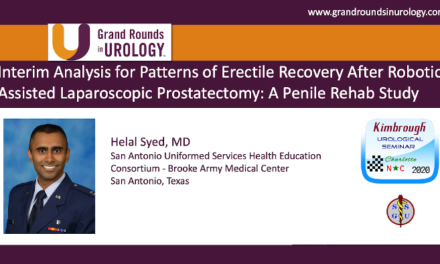Richard E. Link, MD, PhD, presented “Can You Drive a Stick? Prevention and Management of Bleeding During Minimally Invasive Renal Surgery” during the Innovations in Urologic Practice 2020 virtual conference in September 2020.
How to cite: Link, Richard E. “Can You Drive a Stick? Prevention and Management of Bleeding During Minimally Invasive Renal Surgery.” September 26th, 2020. Accessed Dec 2024. https://dev.grandroundsinurology.com/can-you-drive-a-stick-prevention-and-management-of-bleeding-during-minimally-invasive-renal-surgery/
Can You Drive a Stick? Prevention and Management of Bleeding During Minimally Invasive Renal Surgery – Summary
Richard E. Link, MD, PhD, Professor of Urology and the Carlton-Smith Endowed Chair in Urologic Education at the Baylor College of Medicine, discusses techniques for preventing and managing bleeding during renal surgery, emphasizing the importance of maintaining laparoscopic surgery skills that have eroded with the increased use of robotic surgery. He explains that major bleeding complications can occur during abdominal access, critical dissection steps, or during exit from the abdomen, and surgeons need to be prepared with the correct tools and skills. Dr. Link presents a two-phase system for assessing danger and formulating a plan when major bleeding occurs. Phase 1 is short-term damage control, and involves evaluation of blood loss potential, determination of whether the blood is venous or arterial in origin, and a decision on whether the surgeon can handle the bleed laparoscopically with their skill set. Phase 2 is permanent control, and features a reassessment of response to damage control and a decision on whether the bleed can be solved laparoscopically or if the surgeon should facilitate safe open conversion. Adequate assessment is key to proper management. Dr. Link explains that robotic cases should be approached similarly, but emphasizes the importance of good teamwork and being slow and deliberate when there is a bleed during a robotic surgery.
About the Innovations in Urologic Practice 2020 virtual conference:
Presented by co-chairs Mohit Khera, MD, MBA, MPH, and Michael Coburn, MD, FACS, the Innovations in Urologic Practice conference provides a detailed review and commentary on multiple genitourinary and urologic diseases. Among the featured oncological topics are bladder cancer and immunotherapies, as well as upper tract cancer management, prostate cancer, including state-of-the-art imaging, focal therapy, and MRI. Experts also discuss new tools and techniques for nephrectomy and treating advanced renal cell carcinoma. In terms of general urological approaches, the conference also includes pelvic reconstruction and trauma, men’s health topics like male infertility and sexual dysfunction, and ways to diagnose and treat infections in the urology patient. Dr. Link presented this talk virtually at the 2020 conference.
ABOUT THE AUTHOR
Richard E. Link, MD, PhD, Professor of Urology and the Carlton-Smith Endowed Chair in Urologic Education at the Baylor College of Medicine (BCM) in Houston, Texas, is a Board-certified and fellowship-trained urologist specializing in the treatment of urologic disease affecting the kidneys, ureter, and prostate. He focuses on the use of laparoscopic, robotic-assisted, percutaneous, and endoscopic techniques to treat kidney tumors, renal and ureteral obstruction, and urinary tract stones. He directs the BCM Division of Endourology and Minimally Invasive Surgery and is active nationally in teaching these techniques to other urologists through the American Urological Association Office of Education. He has also directed the BCM fellowship program in Minimally Invasive Urologic Surgery since 2008. He is the recipient of several awards specifically recognizing his commitment to teaching and mentoring, including two Fulbright and Jaworski LLP Faculty Excellence Awards (Teaching and Evaluation and Development of Enduring Materials) and several Resident Teaching Awards.
Dr. Link has been an early pioneer in the development of laparoendoscopic single-site donor nephrectomy. He serves as Director of Living Donor Procurement for several major kidney transplant programs in Houston, including
CHI/SLEH/BCM, Texas Children’s Hospital, and the Houston Methodist Hospital.
Dr. Link completed his PhD in Molecular and Cellular Physiology at Stanford University, CA. His research laboratory studies the genetic basis for renal cell carcinoma disease using a combination of genetically engineered mouse models, stem cell biology, and sophisticated whole genome molecular techniques. His clinical research interests include surgical simulation, decision analysis modeling, and the application of 3D reconstruction and printing techniques to surgical education.



